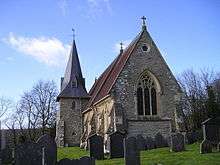Cynllo
| Saint Cynllo | |
|---|---|
 St. Cynllo Church, Llangynllo | |
| Born |
late 5th century Probably Brittany, France |
| Died |
6th century Wales |
| Venerated in | Roman Catholic Church; Anglican Communion |
| Major shrine | Church of St Cynllo in Llangunllo, Wales[1] |
| Feast | 17 July |
Saint Cynllo (Welsh pronunciation: [ˈkənɬɔ]) is a British saint, who lived in the late 5th and early 6th centuries. His feast day is on 17 July.
He is variously described in the genealogical Bonedd y Saint as the son of Usyllt and brother of Saint Teilo.[2] Later genealogies have him a grandson of Coel Hen.[3] Wade-Evans thought he should be identified with Kentinlau who accompanied Saint Cadfan from Brittany to Ceredigion. References to him as Cynllo Vrenin (Cynllo the King) suggest that he was in possession of his ancestral dominions before devoting himself to religious life.[4]
Cynllo's knee imprints are said to exist in a rock, near the farm Felin Gynllo, which lies just outside Llangoedmor in Ceredigion. A Middle Welsh poem attributed to the infant Taliesin includes the line, "Not an empty treasure is the prayer of Cynllo" (Ni bydd coeg gweddi Cynllo).
Several churches are dedicated in his honour, but there is no reliable account of him.[5] Churches and chapels were dedicated to him over almost the whole of Gwerthrynion and Maelienydd. There are churches in Ceredigion commemorating Saint Cynllo at Llangynllo and Nantcwnlle, and also the church of St Cynllo in the community of Nantmel in the county of Powys (formerly Radnorshire).[6] The latter was almost totally rebuilt in the late 18th century.
Near St. Cynllo's Church, Llanbister was a spring called Pistyll Cynllo.[3][4]
References
- ↑ St. Cynllo, Llangynllo Archived 2010-04-30 at the Wayback Machine.
- ↑ Alonso, Justo Fernandez. "San Cynllo", Santi e Beati, June 11, 2008
- 1 2 Baring-Gould, Sabine. The Lives of the British Saints: The Saints of Wales and Cornwall and Such Irish Saints as Have Dedications in Britain, Vol. 2, C. J. Clark, 1908, p. 263
- 1 2 Williams, Robert. A biographical dictionary of eminent Welshmen, W. Rees, 1852, p. 93
- ↑ Monks of Ramsgate. “Cynlio”. Book of Saints, 1921. CatholicSaints.Info. 17 October 2012

- ↑ Lloyd, John Edward. "Cynllo ( fl. 550? ), saint", Dictionary of Welsh Biography, 1959
Sources
- Haslam, Richard (1979). The Buildings of Wales: Powys.
- Wade-Evans, A. W. (1944). Vitae Sanctorum Britanniae et Genealogiae.
External links
- Catholic on-line: St Cynllo